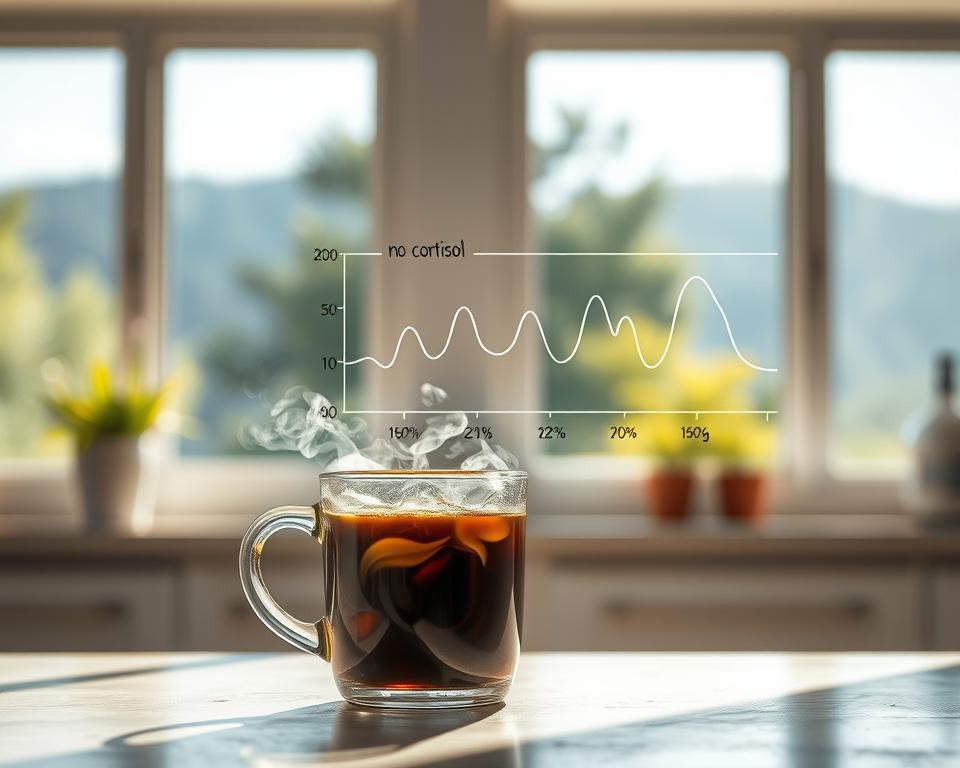Did you know when you drink coffee can change your morning cortisol levels? You might think that coffee is the perfect way to start your day. But, drinking it at the wrong time could actually make you feel less awake. Learning how cortisol and caffeine work together can help you find the best time to enjoy your coffee.
This knowledge can boost your focus and performance all day long. Join me as we explore how to make your morning routine better.
Key Takeaways
- Coffee consumption influences morning cortisol levels.
- Timing your coffee can enhance energy and focus.
- Cortisol, known as the stress hormone, fluctuates in the morning.
- Understanding cortisol can improve your daily routines.
- The best time to drink coffee impacts its effects on your body.
- For more on how coffee can affect stress, check this insightful resource.
The Role of Cortisol in Your Morning Routine
Cortisol is key in your morning routine. It’s the stress hormone that affects your body’s functions like metabolism and immune response. Knowing how cortisol works can help you make better choices, like when to enjoy your morning coffee.
Understanding Cortisol as the Stress Hormone
This hormone keeps our bodies in balance. When you wake up, cortisol levels rise, making you alert and ready for the day. This helps you shake off sleepiness and feel more focused and energized.
If you feel clear-headed right after waking, it’s cortisol at work.
How Cortisol Levels Fluctuate in the Morning
Cortisol levels change a lot in the morning. They peak right after waking and then drop as the day goes on. This natural change can help you know when to have your coffee.
Drinking coffee when cortisol is high can help you stay balanced and focused.

| Time of Day | Cortisol Level | Suggested Activities |
|---|---|---|
| 6 AM | High | Wake up, engage in light exercise, or meditate |
| 8 AM | Decreasing | Drink coffee, start work or study |
| 10 AM | Moderate | Focus on tasks requiring attention |
| Noon | Lower | Lunch and relaxation |
Caffeine’s Impact on Coffee and Morning Cortisol Levels
Caffeine is key in how we enjoy our morning coffee and its effect on cortisol levels. Many know the energizing kick from coffee, but the link between caffeine and cortisol is complex. Research shows caffeine can raise cortisol, which is a stress hormone, in those already stressed. This change makes us think about how much caffeine we should have and our personal tolerance.
Temporary Increases in Cortisol Due to Caffeine Consumption
Drinking your morning coffee does more than just wake you up. The caffeine in it makes your adrenal glands work harder, causing a quick rise in cortisol. This effect is stronger in those who drink caffeine less often or are stressed. For those who drink coffee regularly, the effect may lessen as they build up a tolerance. Yet, knowing about this cortisol increase is important, even more so on stressful mornings.
The Relationship Between Caffeine Tolerance and Cortisol Response
As you get used to drinking caffeine, your body adjusts to it. Many regular coffee drinkers see a weaker cortisol response than those new to caffeine. This adjustment helps keep cortisol levels steady, even when you’re active. But, knowing your caffeine tolerance is vital for keeping your hormones in balance. Finding a balance between enjoying your coffee and understanding its cortisol impact can improve your health.
Optimal Timing: When to Drink Your Coffee
Timing is key when it comes to your coffee. You might want to drink it as soon as you wake up. But, the best time to drink coffee is important for its benefits. Experts say mid to late morning, between 9:30 and 11:30 a.m., is the best time.
At this time, your body’s cortisol levels start to drop. This lets coffee’s uplifting effects work without causing anxiety. Drinking it too early can lead to jitters.
The Best Time Frames for Caffeine Consumption
Knowing when to drink coffee can change your day. Drinking it at the right time boosts your mood and alertness. Here’s a comparison to help you:
| Time | Effects |
|---|---|
| Before 9:30 a.m. | Caffeine amplifies high cortisol levels, leading to jitters. |
| 9:30 – 11:30 a.m. | Optimal timing for caffeine consumption, ideal mood enhancement. |
| After 11:30 a.m. | Caffeine may help, but its effects could be less. |
Effects of Drinking Coffee Early vs. Mid-Morning
Drinking coffee early can make you feel anxious, not alert. But, having it mid-morning is better. It fits with your body’s natural rhythms.
Imagine enjoying your first cup of coffee in a calm moment. It helps caffeine work with your body’s wake-up process.
Health Benefits of Coffee Consumption
Coffee is more than just a morning pick-me-up. It has many health benefits that people often overlook. Starting your day with a warm cup of coffee can make a big difference. It boosts alertness and brain function, thanks to caffeine.
This helps you feel more alert and focused for your daily tasks.
The Link Between Morning Coffee and Improved Alertness
Drinking coffee in the morning boosts your mental energy and focus. Caffeine stimulates your nervous system, making you more alert and productive. As your body absorbs caffeine, it increases neurotransmitter activity.
This makes it easier to get started on your day.
Potential Weight Management Benefits Related to Coffee Intake
Research shows that coffee may help with weight management. The caffeine in coffee increases your metabolic rate, helping your body burn calories better. It also reduces hunger, leading to lower calorie intake.
Enjoying coffee daily can not only satisfy your taste buds but also support a healthy weight. Learn more about coffee and hormones here.
Considerations for Caffeine Intake Throughout the Day
Exploring the world of coffee, it’s key to manage caffeine intake. Coffee boosts energy in the morning but too much in the afternoon can mess with sleep. Finding the right balance improves your day and helps you sleep better.
Knowing your daily caffeine limits is important. Experts say about 400 milligrams is safe, which is like four 8-ounce cups. But, how you react to caffeine can vary. Some feel jittery with small amounts, while others handle more without problems.
Genetics play a big role in how we process caffeine. If your afternoon coffee messes with your sleep, cut back. A tailored coffee routine can make your day better without ruining your sleep.




